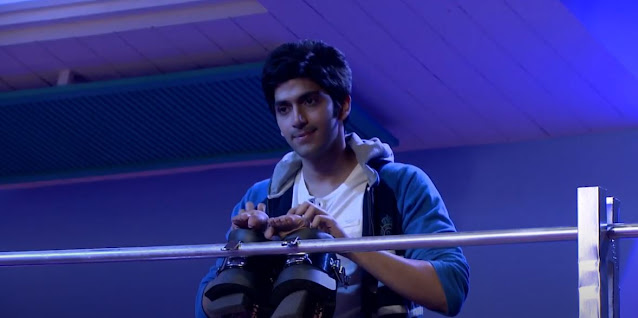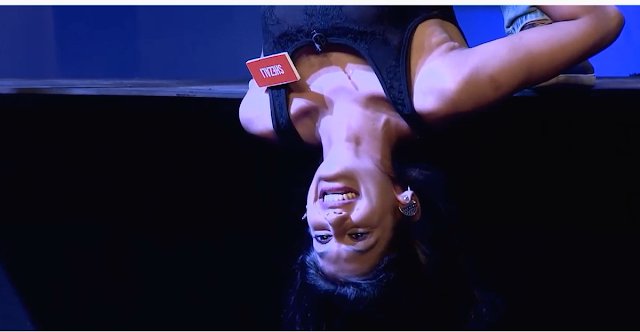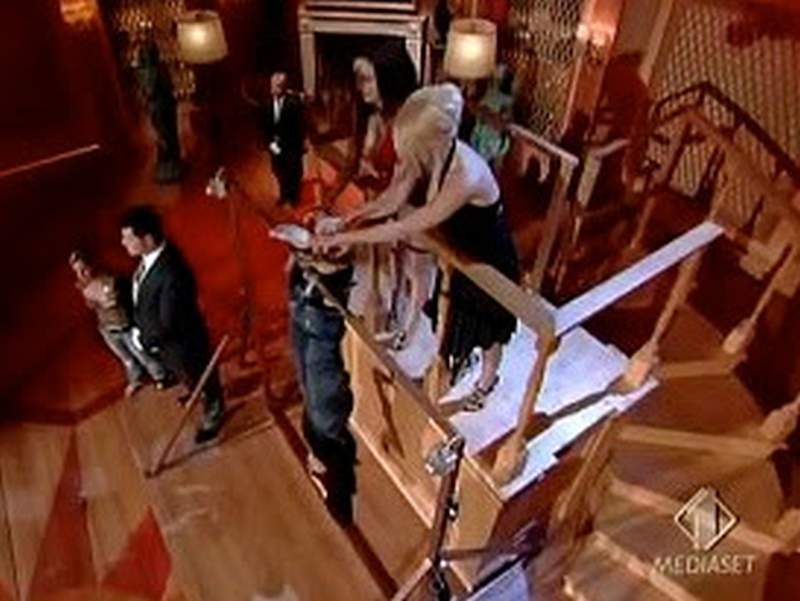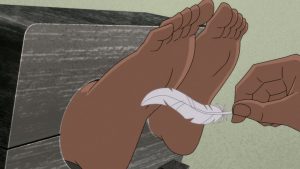Distraction was a television program broadcast from 2003 to 2004 in the United Kingdom and later replicated in other editions in various countries around the world.
The program involved contestants being subjected to bizarre tests for the aim of disturbing them as they attempted to answer easy questions. A series of hecklers would intervene by practicing physical, visual or auditory distractions on the contestants in order to make the attempt to answer the questions as difficult as possible.
Some of these tests involved attempting to answer questions while being subjected to various forms of tickling. Contestants were usually pinned to rods while attendants were in charge of tickling their bare feet for the entire time of the test.
There are many versions of tickling scenes in “Distraction” TV show.
Tickling in Distraction (UK edition)
In each episode of the TV show “Distraction,” four contestants, typically consisting of two women and two men, participate in a series of three rounds. Prior to the first round, they become acquainted with each other’s embarrassing moments, unique hobbies, strange talents, or previous unflattering occupations as they respond to inquiries posed by the host, Carr. Throughout the game, Carr presents relatively straightforward questions that the contestants must answer, all while enduring a variety of uncomfortable, painful, and/or unsettling distractions. These distractions can be inflicted upon them during the round, initiated by a contestant to provide an answer, or triggered as a consequence of a correct or incorrect response. At the conclusion of each round, the contestant with the lowest score is eliminated from the game, exiting without any winnings.
In the english version, A man gets his feet tickled by two women. He tries to answer questions but at various times he stops to laugh.

Tickling in Distraction (indian edition)
In the indian version, two women are hung from a bar and tickled on the feet by a man.
The first woman remains impassive as her feet are tickled.


The second woman smiles and sometimes laughs while she is tickled in the hips and feet.


Distractions reduce our attentional capacity, interfere with cognitive processes, evoke emotional responses, encourage multitasking, and may trigger habitual responses. These factors collectively contribute to our difficulty in maintaining focus when we are distracted. Our attention has a limited capacity, and when we encounter distractions, they compete for our attentional resources. If our attention is already occupied by irrelevant stimuli or thoughts, there is less cognitive capacity available to focus on the task that requires our attention.
Tickling in Distraction (italian edition)
In the Italian version there are three tickle scenes.
In one episode, two women are hung up and tickled by two very women.
The blonde girl is very ticklish.
As soon as they touch her feet she starts laughing loudly.




During the whole rehearsal she tries in vain to remain serious but constantly bursts out laughing. At some point she has to catch her breath as she doesn’t stop laughing.
The second woman is much less ticklish, she looks more annoyed. She hardly ever laughs, except when she exclaims “But how can I do it, it tickles!”

In another episode, a woman and a man are tickled.
The blonde woman almost never laughs but she is distracted by tickling with a feather. Even the host exclaims “You’re not ticklish, right?”
Being tickled can be distracting because it activates several physiological and psychological responses in our bodies. When we are tickled, it triggers a reflex response that activates our body’s defense mechanisms. The sensation of being tickled can cause us to involuntarily jerk, squirm, or laugh, which can be distracting in itself.
Tickling also activates the somatosensory cortex in the brain, which is responsible for processing touch and sensory information. This sensory overload can overwhelm our brain’s processing capacity and divert our attention away from other tasks or thoughts.
Moreover, tickling often involves unexpected and unpredictable touches, which can catch us off guard. Our brains naturally prioritize processing novel or unexpected stimuli, so when we are tickled, our attention is quickly redirected to the tickling sensation.
Additionally, tickling is often accompanied by laughter, which is a social response. Laughter releases endorphins and triggers positive emotions, which can further distract us from our current focus or activities.
Overall, the combination of physiological reflexes, sensory overload, and the social aspect of tickling can contribute to its distracting nature.

In another episode, some men are tickled on the feet by dogs, and laugh as they try to answer questions.













